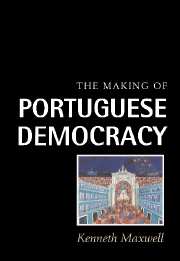Book contents
Introduction
Published online by Cambridge University Press: 24 November 2009
Summary
This book is concerned with dictatorship and its legacy; with revolution and its history; and with the emergence and consolidation of democracy. It is an attempt to discuss and to explain the making of Portuguese democracy. The Portuguese revolution of 1974–76 is at the center of the transition to democracy in Portugal as it is in this book. It was an extraordinary period – unexpected, much misunderstood, dramatic in its effects on the international scene. The Portuguese upheaval was more like the European revolutions of the 1820s and 1848 than like the “great” revolutions of 1789 in France or 1917 in Russia. That is, it was startling in psychological power, yet limited in its ability to reorder society; significant enough in its impact to transform the context of social and political discourse and the institutional context within which political power is exercised but, once over, hard for many outsiders to take seriously.
In some peculiar ways, however, the extraordinary events of the mid 1970s are already ancient history, and the Portuguese constitution and economic system are both marked by a selfconscious escape from the legacy of this period. For reasons I hope to explain in this book, contemporary Portuguese democracy rests in part on the sublimation of this conflictive experience which tends to make for a highly fragmented view of these events, and risks making the history of those years the captive of selective memories.
- Type
- Chapter
- Information
- The Making of Portuguese Democracy , pp. 1 - 6Publisher: Cambridge University PressPrint publication year: 1995



